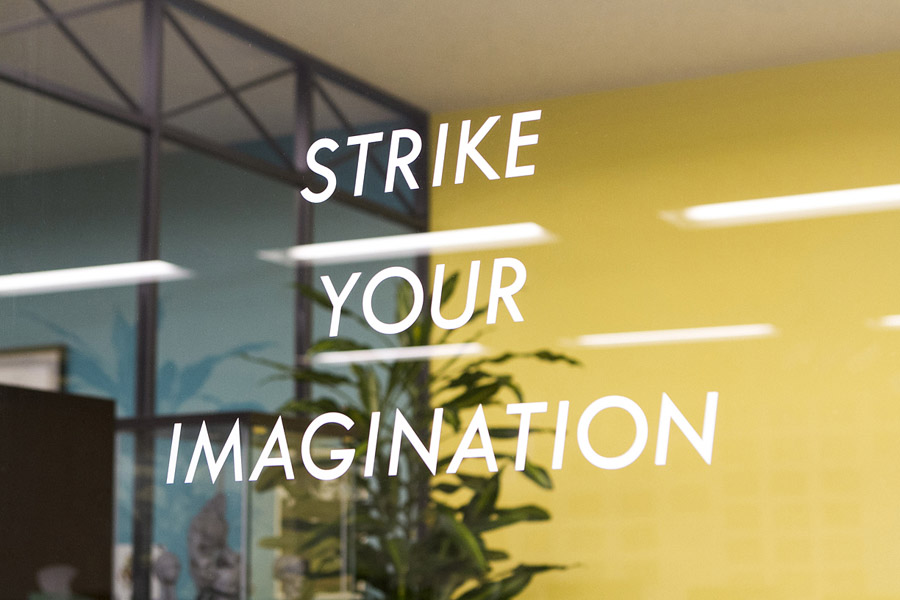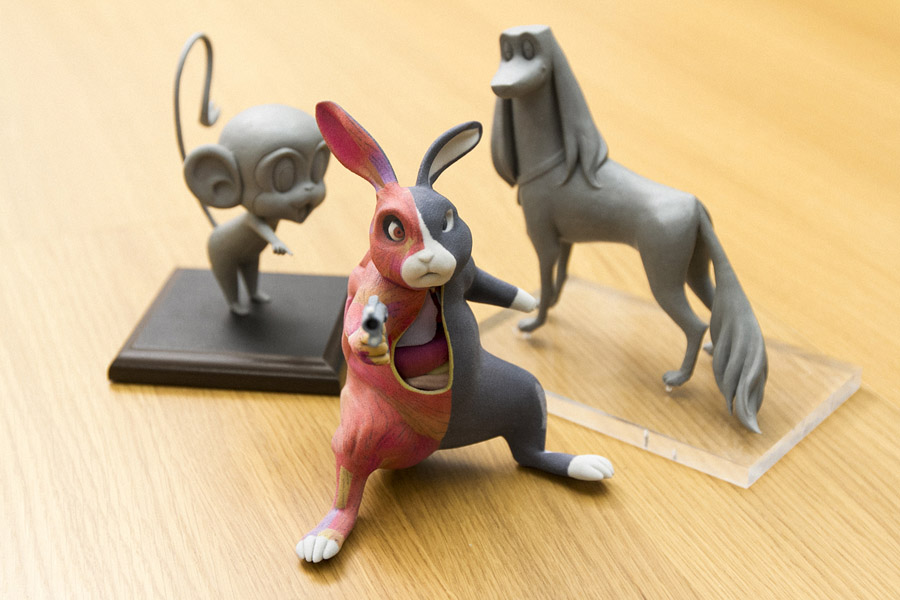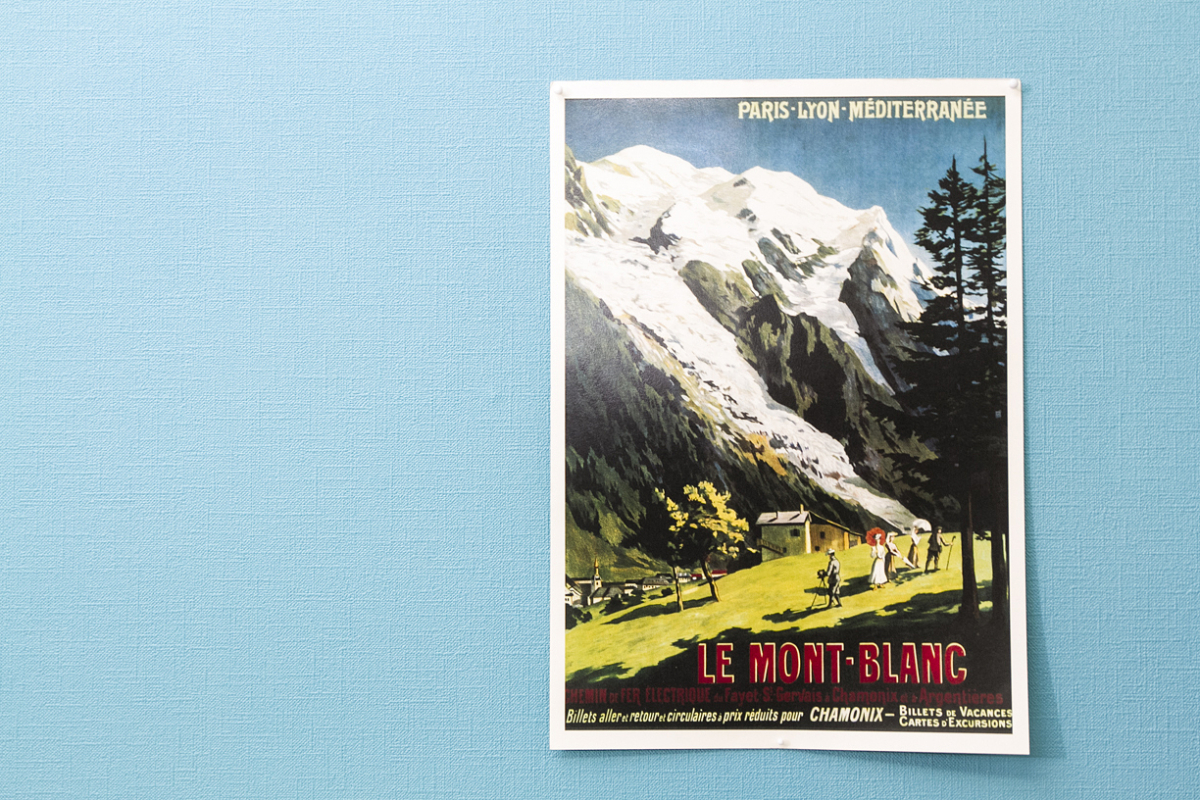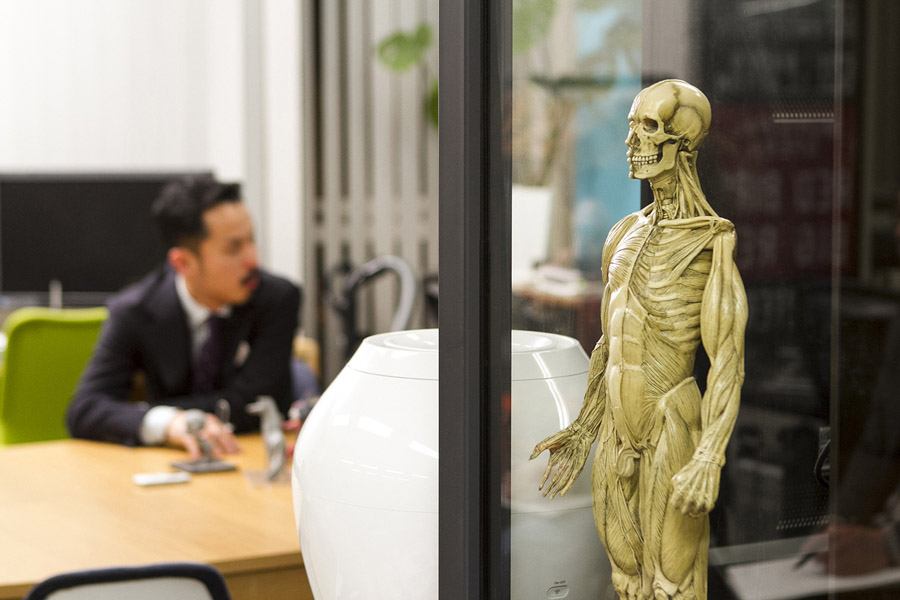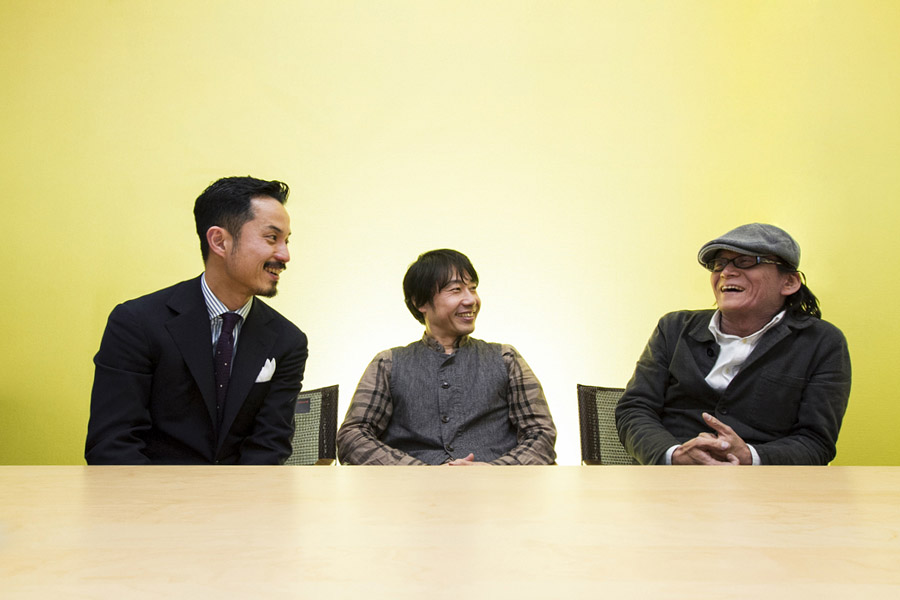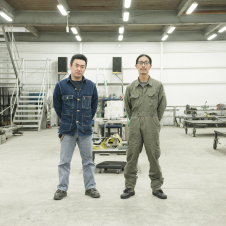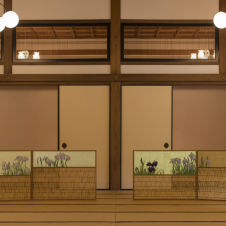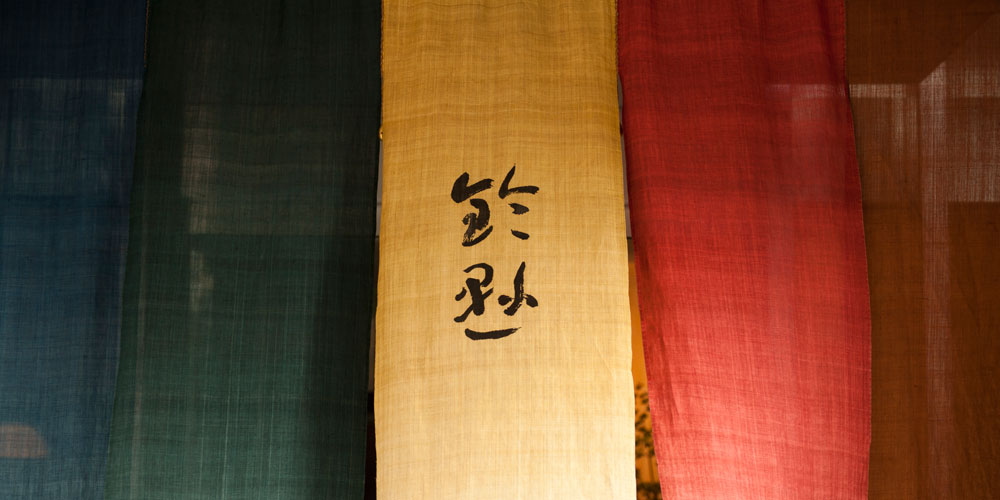Creator’s Philosophy
諦めなかった。それだけ
Words by Kenji Jinnouchi, Photographs by Takato Shinohara,Edit by Masafumi Tada
Hitoshi Takekiyo is an animation film director, who has been a great adviser for Fujito’s business.
They both work in different fields, one in the fashion industry and one in the film industry, but Fujito has learned many things from Takekiyo’s creative ideas.
The following interview was held at his studio, Montblanc Pictures with the two of them along with another friend, composer, Kenjiro Matsuo.
Where There Is A Will, There Is A Way
Fujito: You are so famous now, aren’t you, Matsuo!
Matsuo: No-no, but I guess I have started accomplishing almost everything I had hoped. Actually, in 2010, I tried to make a to-do list for the following 3, 5, and 10 years. Speaking of 2010, it was a bit before when one of my commercial films, Xylophone (Mori no Mokkin) was awarded the gold prize at Cannes Lions, and after that, my life started going well according to the list I made, so to me, that’s simply amazing.
Takekiyo: I think he is great because for a long time he wouldn’t give up on what he was doing, even though there wasn’t a lot of money to be made in that kind of media work and sound design.
F: When did you start making good money?
M: It’s far from good money, actually! However, anybody who has a job like mine usually has strong will and dedication; we as individuals think “I should just make what I want to make”. That is the thinking which will ultimately lead us to our goals. We do our best not only on our own work, but clients’ requests as well.
F: The first time I met you two, you both already looked very accomplished in what you were doing.
M: I wasn’t like that. Yeah, Takekiyo has been doing very productively since then. His film “BANANA” became one of the MoMA’s collection when he was studying at university. I want my work to be in the MoMA’s collection, but he did it a long time ago, so it’s fantastic.
T: At the time, I was really into making something artistic, but now, I have thoroughly changed my direction of work towards the entertainment industry.
M: I remember when you started making something for entertainment. That was a short film animation for a cable channel, one of the projects of “STATION ID”, if my memory is correct. It was a little over the top for its time and I was worried if the characters he made were ok for all viewers.
T: I’m glad that we didn’t have SNS at the time. There may have been horrible attacks towards us through the internet.
M: I could see you were really challenging anything too soft in the industry and it was full of sarcastic humour.
T: I think that’s right. Afterwards, I decided to use one character, the human anatomy model guy from the film, for the movie “After school Midnighters”.
M: So, do you think this was a major changing point in your life?
T: Yes. Also it changed people’s evaluation on my work. I learned that making a movie can give my life a lot of meaning.
M: There are so many movie directors in the world, however, only about 10% of them can be referred to as a director.
Furthermore, maybe 10% out of that group would be able to make movies that are accepted at small theaters in towns and another 10% can be previewed in big theaters in Japan or overseas…is that right, Director?
T: What should I say? In my case, I simply didn’t give up on what I wanted to achieve, I was lucky to have a lot of support from my work friends.
F: I say the same thing when I get an interview about my career, “I just kept doing what I do.”
M: I would compare it to winning the lottery. You can’t tell unless you try. The more lottery tickets you buy, the more chances you will have to win.
T: Hey, there were many times I didn’t win!
M: When you were making the movie, I remember that your work wasn’t very prevalent in the public eye for around three years. Was there ever a time when you felt apprehensive about the work you were doing, maybe the times you could see the people around you succeeding with their work?
T: My desire was this; “I have to dive into the entertainment business from the advertisement industry!” So, I wasn’t too anxious. I knew it was a very important process to grow my project.
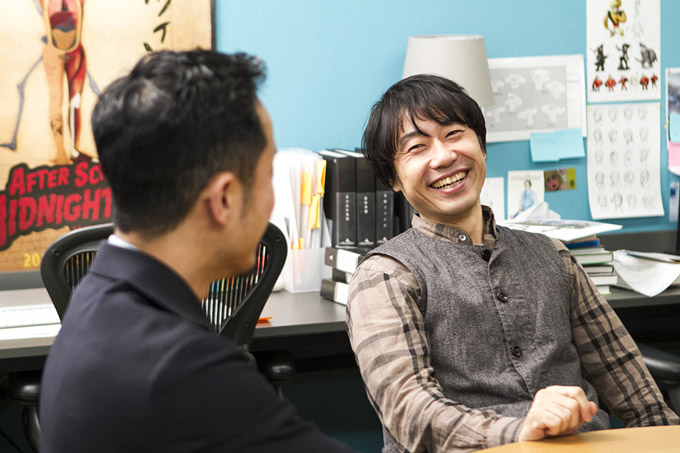
Thanks To The Digital Generation
M: I think Takekiyo is basically very talented in design. He has a great combination of senses with design and entertainment and I don’t think there are a lot of people like him.
T: First of all, I really liked one person who was working in the design industry. He inspired me very much.
F: Who is it?
T: Well, I don’t remember his name…
M: Somebody in the past.
T: Anyway, afterwards, I realized who my heroes are. George Lucas and Steven Spielberg! So, I decided to get serious about my work in the entertainment business. I think it was in 2003 when we were able to start using digital media.
Thanks to the internet, we started feeling free from the stresses of doing business strictly in Fukuoka.
F: I see. Digital circumstances helped your business a lot.
T: It was surprising how much the internet could cover within distance and time. Compared to other cities in Japan, Fukuoka had a noticeably smooth transition when it changed over from the analog life to the digital one.
M: You know, because of the internet allowing me to do business anywhere, I also worked out of London for a while.
F: But why was it London?
M: At the time, I thought the city was on the cutting edge! As represented by Alexander McQueen, the movie, “Trainspotting”, or from works of the design team “TOMATO”. I had launched a new company with my friends and by chance I read some article, which said “the internet has connected the world” and I trusted it. “If it is true, why not go to the hot city, London?!” even though I couldn’t really speak English…funny. However, back in the time, internet connections were not well supported like today, so I would spend a whole night just to send 30MB of data by ISDN. In just one year, I had spent a million yen for internet service!
T: Was it worth it?
M: Absolutely! Today’s members, including myself are sharing the keyword ‘Fukuoka’ when speaking about ourselves for media, right? However, I don’t think we are just identifying ourselves with Fukuoka all the time. What do you think?
F: No, I don’t think so, either.
M: Of course, where I am based is important but I don’t mean to commit my loyalty to Fukuoka. Actually I keep saying I’d rather be grounded to 3 places in my life, instead of just one, because I think humans learn things when they compare with others. You can view everything in many ways, like Tokyo viewed from Fukuoka and Fukuoka viewed from Tokyo, and Japan viewed from overseas.
F: I know what you mean.
T: However, I definitely can state that Fukuoka has had a huge impact on me.
M: We need to see other places in the world before we say Fukuoka is the best for us.
T: Yeah, I keep in mind that I want to be challenging with everything I do to keep a good balance in life. Even though I say this, doing business in Fukuoka isn’t too bad for creators like us because there are not so many competitors in the city. However, it actually has another side of the problem, people would stop being challenging and aggressive in business .
F: That’s true. That’s why I would like to go to Italy to visit Liverano once or twice a year because I can hear his wry comments about me.
T: What comments does he give you?
F: Well, maybe it’s nothing, but for example, “Do you think you’re dressed neat enough to impress girls?”
T: Haha, he is an Italian guy!
F: I’m 38 and not so young anymore, so generally people don’t give those kinds of comments to me. Luckily, I have two more great advisers like him. I love how direct their wry comments are.
M: My mother is like that too. She still asks me “What are you doing for a living?”
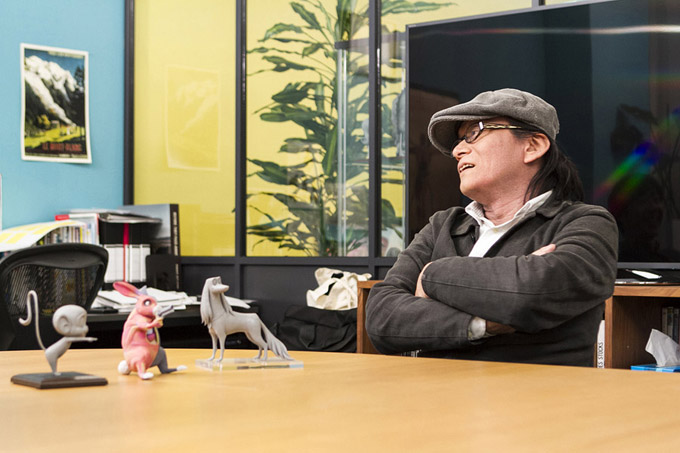
Imagination Decides Everything.
T: I don’t think we can describe Matsuo as just a musical composer. When I visited him at his office of “Invisible”, I saw a lot of paper crafts scattered on the floor. Then I asked him about them, and he said, “That’s the packaging for DVD samples.”
M: Ever since I was young I have been doing something like that, once I got interested in it. I know I have wasted my energy on things like that sometimes, but some people are fond of my jimble-jamble work.
T: I know. That’s why you went into making robots.
F:How did the project get started for the robots*?
(*Z-MACHINES: A robot rock band, which members are the guitar robot that has 78 fingers to pick two electric guitars at incredible high speed, the drummer robot that has several arms and legs to beat 22 of percussion, and the keyboardist.)
M: That was a request from one of my clients. I meant to make an mechanical music player at the beginning, but they said, “How about robots?”, I had said, “No way” for months, but finally I had to accept the request.
It might sound like I was reluctant to try it, but actually I really thought it would be exciting. I also expected it would be a very big project. Certainly, I had to work night and day for 8 months.
As a result, it succeeded very well and we received so many offers for their performance from overseas, but we figured out it was too heavy to ship the set of machines out of Japan…
F: Can the machines play more than one song?
M: Yes. I programmed many songs. Would you like to have a look?
( Everyone watches a ‘making of’ video when they were working on Z-MACHINES collaborated with Squarepusher.)
(At the beginning, the first drumming test by a machine made a weak sound and they all laughed so hard)
M: You know, it was horrible because at the time, we had no idea how strong it should have been!
F: Sorry to laugh, but, even though you guys were working so hard, it sounded too wimpy.
M: After this, I changed the material to aluminum. It started working better.
T: Is that hydraulic?
M: No, it’s pneumatic. (Very strong ringing sound occurred) This is from a guitar, though. It can be sped up to 1000 BPM.
T: (The drummer machine twirling drum sticks) Nice! It has very comical side and high tech side. That’s completely different from automatic piano players.
M: I think everybody gets excited with any kind of robot. As soon as we had completed the machines, we started looking for a song and we received an offer from Squarepusher! After, they sent a song to us, which by the way, sounded too complicated to be programmed. I thought they were just genius.
T: It’s just perfectly awesome. I like this more than Xylophone (Mori no Mokkin).
M: Would you like to watch the ‘making of’ video for Xylophone (Mori no Mokkin), too?
(In the ‘making of’ video, the staff try fixing the lane many times to let the ball go on it to the end.)
T: Phew, that made me kind of nervous. I felt like I was the ball.
M: The first time it went well to the end was three days before the shooting date. It came down to fate.
F: I have a question for both of you. When you work as a producer, what do you think about ‘making of films’ from the view of a producer?
T: Some movie director said that each of your staff like a prop man or a lighting technician who have pride in their jobs in the movie would help your work to be successful.
M: It makes sense. Each member of the team has pride for their part in the movie. Good relationships make good movies. It doesn’t matter how big the budget is.
T: I think any project team including Pixar and Disney run off their own time and money all the time!
F: When your team faces a problem, they need you as a leader, right? Nobody knows if the movie shooting is going well through the end of it. Now I have a question, have you bluffed your way out of any problems during movie shooting so far?
M: Yes. I’m always bluffing. When we talk about what we can do to people, we should exaggerate it 20% more than the real thing. Then, we end up doing our 120% best. It makes your ability keep going up to 20% more every time.
T: Speaking of my job, I can’t do the same kind of thing as you said, because I can never get enough of a budget, or workers for films. What I do is a little different. It’s like we allocate 20% of the budget for something beyond my actual ability first, which would be the most attractive feature in a film work. Even though I sometimes need to give up on some technical parts, the 20% where I decide first always helps to lead me through to 120% completion.
Get Chances And Flatter Yourself!
F: I really like your story. That 20% is the way you are, right? I was also thinking about what rules are important for my life and work, but I didn’t have the exact one for myself yet. As you said, if I had my own check list for business or life, I think it would really help me to make some decisions in my life. By the way, how do you two notice such great rules or philosophies from your lives? I’m so curious!
T: You have been writing down your thoughts, haven’t you, Matsuo?
M: Yes. Saving thoughts is a very useful tool. I use Evernote. However, it’s never easy for anyone except me to understand…
F: Come on! Readers on the web site would love to know your unique ideas!
M: Would they? Sure…I was a university student when I started a material book for ideas flooding from my head. I was so scared if I had lost them suddenly. Basically I just like collecting not only ideas but also anything around me.
I have a closed Youtube channel for my private memory, too. There are tons of videos there! Care to have a look? This one is about ’a review of my analytical ability’…
F: When do you write down that kind of thing? When do you find the time?
M: I think there are several types of people who can succeed in their businesses. Type #1 are those who just love their own jobs, #2 are just so lucky, #3 believe in their abilities way too much….I think this type is the best, because this factor is very important to make a first step out of your world. #4, genius type, #5, analyst type…I am this type. If you are good at seeing people’s needs and insights, you must never lose your job. I always think something like that when I drink.
T: I like reading, but I have just analyzed why and figured out that I just need a good trigger to arrange my thoughts in my life.
M: True. There is a saying, “Fools say they learn from experience. I prefer to learn from the experience of others.”, but I think it means we have still have a choice if we go through the same kind of unsuccessful experience made by someone else.
F: I see. By the way, I think I am the type who believes “I am different from others”.
T: Why do you think so?
F: For example, I established my fashion brand for men in Fukuoka. There are many brands for ladies fashion, but none for men that have succeeded here. No one has experienced it yet but I somehow think I can.
T: That’s great.
M: Yeah, keep going! You’ll never know until you try.
F: It’s worth trying because there is never a guarantee of success.
T: If you can picture your future success story in your head, it’s a little easier to become real. However, I guess how lucky we are makes way to success, too.
M: He’s right. Having luck is the best thing! There are a lot of people who are talented but have no chance to show their talents to the world.
T: When I set up my old company (KOO-KI) with my friends, first of all, we had no job but had a lot of time. So we went to a DIY store and got pink paint, and colored the company door in pink. We were so easygoing.
After six months, we started getting a little busier somehow, but I felt maybe we just had good luck come our way.
M: Yes. Without any luck, we couldn’t have paid the bills either!
T: By the way, I guess it was good that I was in Fukuoka at the time. If it happened in Tokyo, I may just have been stressed out so much.
M: I would have quit this job earlier, if I had kept working in Tokyo’s atmosphere. When I started my career, I was kind of wimpy, maybe even now, so I did my job very quickly there and got back to Fukuoka right away before people criticized the jobs I had done there. However, I could make myself look bigger in Fukuoka with my work from Tokyo. I kept doing that so many times and one day, I realized where I work doesn’t really matter in the industry.
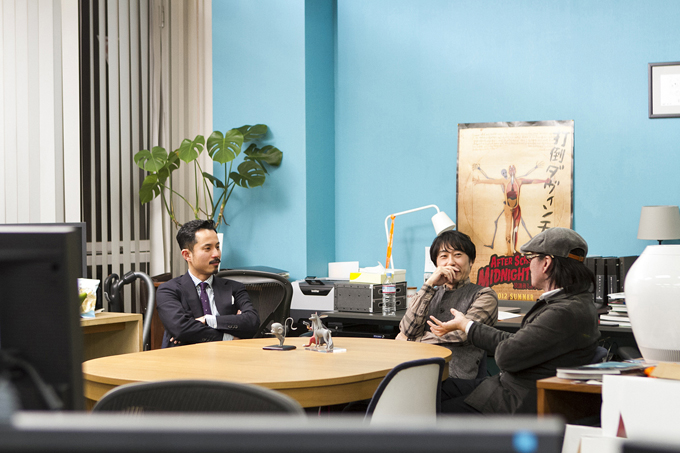
Output Before Making Yourself So Perfect
T: We can operate our businesses from Fukuoka with no stress for sure these days.
F: Yeah, it’s fantastic, isn’t it? Do you remember when I was talking about my idea, opening my shop in Nagahama to you about 5 years ago? You told me, “Just do it.” and you were so positive and supportive toward what I was thinking.
T: Where there is a will, there is a way!
M: Yeah, Just do it! There is a good example story, but it’s from a cartoon by Kohji Aihara, which is about a produce market sales lady…
T: I know that one! Good story.
M: It’s a four-panel comic strip. First, a middle aged lady is selling vegetables. Second, she is a genius in Physics and would be smart enough to get the Nobel Prize. Third, however, she is still selling stuff at the store, and the fourth, she worked there until she dies…The point is, even if you are very talented, but don’t use your skill and show it, it won’t mean anything. So, don’t be so scared and just do it.
T: It doesn’t matter if your output is far from perfect, even if it’s at 20% perfection, give it a try anyway. People around you can help you to make it 50%.
M: Hang it there to make it at least 30%.
T: I think, recently, young people are looking for jobs which they are good at, however, I hope they would also think twice if they can have passion for it and enjoy it through their lives. If what they choose are challenging and worth trying in life, we as humans can at least feel some happiness from that.
F: It was a lot of fun having this interesting talk with the two of you!
M: You know, old guys have many life experiences, so ask us anytime! Men can never avoid it.
T: You may even have your own business philosophy already in your mind. You can’t help sharing it.
M: Actually, I don’t even mind if no one listens to my story when I start it.
T: Although great things happened to Matsuo, it doesn’t mean great things will happen to others if they do the same.
M: Learn from my experiences, but try it in your own way.
F: That’s true. Thank you very much for today’s talk!
T: Thank you, too! I hope we can meet like this again very soon!
Kenjiro Matsuo
Composer, Musical producer etc.
He was born in Fukuoka in 1966, and is the director of Invisible designs lab. He mainly composes music, however, also produces anything in both analog and digital ways.
Recent works: SQUAREPUSHER×Z-MACHINES EP, NHK E-television channel TECHNE, a commercial film, “Xylophone”(Mori no Mokkin)
http://invisi.jp
Hitoshi Takekiyo
Animation film director
He was born in Fukuoka. After he graduated from Kyushu Institute of Design (currently, Kyushu University), he experienced working at TOEI and Kobe design University. Afterwards, he co-established the creative studio, KOO-KI, and founded MontBlanc Pictures Co.,Ltd. in 2012. “BANANA”, which he produced in 1991 is part of the collection of MoMA, New York. One of his films “Afterschool Midnighters” was played in theaters in 5 countries of Asia in 2012 and is to be played in 250 theaters in Europe in 2014.
http://mtblanc.jp
Go Fujito
The designer of “FUJITO”
In 1975, he was born in Sasebo, Nagasaki.
In 2002, he launched “FUJITO”.
In 2008, the flag shop “Directors” opened.
In 2014, he co-organized the exhibition “thought”
http://www.wstra.com
